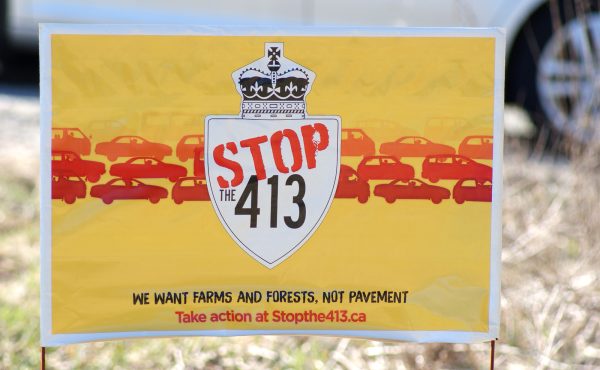The federal government earlier this week designated 2011 as the “Year of the Entrepreneur”. A worthy cause, certainly, but as news stories and comments quickly pointed out, it was not accompanied by any real programs or initiatives.
Perhaps there are some things that could be done at the municipal level, though, to encourage entrepreneurs. Certainly, it’s a designation that fits well with the business-oriented rhetoric of the new Mayor.
In our Spring 2010 issue on “Rules”, for example, Jonathan Spencer wrote about how current zoning and other bylaws make it difficult to create small retail spaces that can serve as a stepping-stone for entrepreneurs who want to start shops or services on a tight budget (the article is not yet available online). It’s as if the lower rungs of the retail ladder are missing.
An obvious place to start is street food carts. Toronto is full of new arrivals from places with thriving street food cultures — but it is currently almost impossible for them to replicate those services in Toronto.
The situation is almost comical. Street food vending is governed by an outdated bylaw from the old City of Toronto that has not yet been harmonized to make it apply to the whole amalgamated city. On top of that, there is a moratorium, imposed in 2002, on issuing any street food vending licences to new vendors in downtown Toronto (Wards 20, 27, and 28) — the wards with the greatest density of pedestrians, where street food is most desired and most viable. The moratorium has resulted in the gradual whittling down of the number of vendors in this area.
There seemed to be an opening for a blossoming of food carts in 2007, when the province loosened the rules governing what kinds of foods they could serve, but the City did not take full advantage of this opportunity. To avoid having to engage in the complicated and potentially controversial project of updating and harmonizing the old bylaw and rescinding the moratorium, the City instead stepped around the issue by introducing a pilot project, the much-derided “Toronto a la carte” program, which allowed only a small and tightly controlled number of new food carts and failed to make much impact.
The conservative wing of council argued at the time that the “Toronto a la carte” program was excessively complicated and expensive. Denzil Minnan-Wong said “I don’t see why we have the city government trying to involve itself in business. Surely we have better things to do. We should let vendors do what they do best.”
Now that they are in power, here is a great opportunity for council’s right to encourage both entrepreneurship and the vitality of the city’s public spaces, by finally opening up all street food vending to a simple, fair licencing system. The first step is to harmonize the street food vending law, letting the vendors have more say in the choice of foods, focusing regulation on health and safety (e.g. making sure the food is safe and the carts are located in appropriate spaces that don’t block the sidewalk), and opening it up to all parts of the city (they are currently not allowed in Scarborough or Etobicoke). Entrepreneurship can be further fostered by continuing the rule that individuals can only hold one licence, keeping the business open for new owner-operators.
An example of the potential for food cart vendors can be found in New York’s new “Green Cart” program, which enables fruit-and-veg carts to establish themselves in parts of the city designated as “food deserts”, where there is otherwise little access to fresh produce. There are already informal versions of this in Toronto, where entrepreneurs drive to apartment complexes and sell fresh produce out of their vehicle — but rather than being part of the underground economy, these could be made legal, and even encouraged.
Another way to foster entrepreneurship would be to look for ways to make it easier to establish stalls — semi-permanent outdoor structures that can be built in smaller spaces, such as underused parking lots and those empty grassy spaces in front of many apartment buildings. They might be particularly useful in suburban areas that lack nearby retail, providing an opportunity for local community members to start businesses that serve local needs while only needing a modest, affordable initial investment.




13 comments
Dylan, great piece, it would be very exciting to pursue some of these ideas at this time. let’s cut through some of that red tape and narrow the gap between people’s food supply and the long walks or drives they have to shops and services.Another absurd twist to this story is that you can have veggie stalls and vans in some parts of the city but not others – there’s one at Regent Park for instance but not in Scarborough. It seems the same green pepper is considered legal in some parts, and the bearer of food-born illness in others. Bring on the veggie vans and shwarma carts city wide!
I’m a socialist who believes the commanding heights of the economy should be nationalized and even I thought the a la carte program was too much government control.
Agreed! Great ideas to support vending as viable employment and contributor to an accessible, lively public realm.
Great Idea. Recently was in Vancouver and really enjoyed some of their new street food carts. Here’s an article from the Globe about them:
http://www.theglobeandmail.com/news/national/british-columbia/vancouvers-addictive-new-street-eats/article1797779/
If this is one way the current city administration can make its mark, then I beg it please to do it (as opposed to running after an NFL franchise where undoubtedly it will cost $10 for a crappy hotdog).
The least Ford could do is give us some gravy through decent street food. Montreal can do it, Vancouver can do it so let’s sort out the control freaks under Filion’s previous regime and give priority to any of the vendors screwed under the A La Cart program.
This is one of the small things that makes Tokyo far more vibrant at street level: “small retail spaces that can serve as a stepping-stone for entrepreneurs who want to start shops or services on a tight budget”. I’d wager this is true of many of the other vibrant cities of the world.
In areas such as Tokyo’s Shimokitazawa there are retail and dining spaces smaller than some Toronto apartment kitchens. If five of these can fit in the space that one business takes in Toronto, you have five times the choice. The business owner can do this at a much lower cost, even at Tokyo’s rents (though Toronto’s are so high I do not think Tokyo’s expensive reputation is so true, comparatively). There are also tent-like ‘yatai’ along some streets where you can get a bite and a drink.
Thanks for that Vancouver link. I am now very jealous of Vancouver’s street food. There’s no reason why we couldn’t do that here with a bit of political will.
If Ford can fix the paranoid bureaucracy of street food licensing, I reckon he might just win a downtown ward or two next election. No joke.
Portland also has some amazing street food initiatives, especially involving surface parking lots.
https://spacing.ca/toronto/2010/11/20/loving-parking-lots-in-portland/
The real unspoken reason progress has not been made on the food-cart front in Toronto is simple: the current system is run by the Mafia, and for whatever reason they like it the way it is.
Vancouver’s pilot program went better than expected, allowing 17 vendors to open last year. 15 more are to be added this year, but not without some controversy.
They plan to enforce health guidelines (sound familiar) and are going to use a ‘foodie’ panel to choose the vendors.
Some are concerned of favouritism with this process.
http://vancouverstreeteats.ca/its-official-15-new-food-carts-coming-to-our-streets/
So does that mean i cant open a street food cart,that sucks.me and my girlfriend wanted to open up something just for the summer,i was really serious.does anyone know where i can get any info or who i can talk to.there goes my chance of becoming a young Entrepreneur.